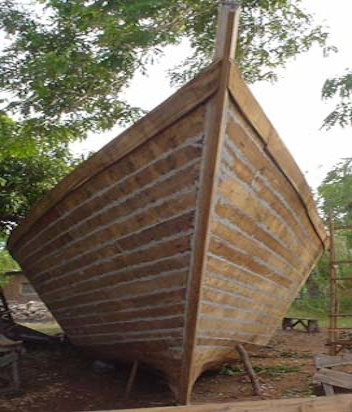
| Greetings Home |
| Previous Greeting |
|
|
| Previous Dhow Logbook |
| Next Dhow Logbook |
Crtd 06-01-13 Lastedit 15-09-14
Saa Moja
The author in charge
Monday: caulking port 9 lines, Starboard 6 lines, inside: bolting stiffeners.
Saa moja means one o'clock,
seven western time
counting.
Monday morning six. At a quarter past six you see the first light, growing to
full daylight in half an hour. I know this mainly from theory. On my way to the yard
the roads were full of children. Apparently, schools start at seven. How could I
know? Amazing!
This day I will have to do without Gabriel. At five past seven I arrive at the
ship yard, determined to fire everyone arriving after me.
The yard is empty.
At twenty past seven Johnny appears, a caulker. He refuses to work for the TSh
2000 per "line" (joint between planks from front to back), quoted by
Daniel on Saturday. The lines are high, so the work is difficult. He needs TSh
3000. After having called Daniel (Daniel! Saa moja, uko wapi? Seven, where are
you? I am coming), having promised to stay till Daniel has arrived, discuss it
with him and pay for sure what shall be agreed, which takes ten minutes, he
starts working. Daniel arrives at eight. I decide to get tough on this the next
day with Gabriel.
Daniel, negotiate with this man. I pay, but remember, it is your money!
(Nitalipa, lakini ukumbuke ni pesa yako!). This ritual turns out to consist of 15
minutes of laughter and ends up with TSh 2500 per line. To be paid in advance
- again ten minutes of laughter - to be paid at the end of the work,
no, believe us, the muzungu stays all day, he will not go away.
Half an hour later Moses arrives, the other caulker, who also had been
instructed to come at seven. He receives the scorn well willingly, accepts
Johnny's deal without a word and starts caulking. Caulking starts with beating
strips of hard gray blanket in the joints (see photo below)
Welding of metal stiffener triangles would be done at Feleshi's saw mill, but at
ten there is still nobody seen to be going that way (the dhow yard is on the
access road). I conclude I am not the only one systematically missing sunrise in
Africa, call Feleshi, who shouts: I am here! And indeed is just approaching us
from the side of his mud road wearing and elegant bath soap perfume. Yes, my
welder will be Shire, he will call me when Shire has arrived. Shire does not
need much explanation, apparently this is a standard type of job. The only
thing I have to do for him applying Pythagoras' law to have every 150 cm piece
cut in 44, 44 and the remaining 62 cm (which later turned out to be wrong
because the angles are all irregular, but it gave him a start). Without further questions the little man
the rest of the day walks between his workshop in my dhow in quick steps.
Then the muzungu does leave the yard, to the alarm of Johnny, who comes running,
fearing for his wage.
Johnny has to be reassured: we do not tell him the muzungu is broke and already
yesterday even dined on credit, but we concede he is going to the bank to get money.
With the help of everybody, Johnny gets convinced and gets back to work.
I start to mark all places with bad or lacking screws. Marking only takes me an
hour..
The muzungu also goes for 2 saw blades and welding sticks for Shire. That
requires some talking, because the shopkeeper holds me for a staff member of
Kees, who has debts. After having given some useful details of
Kees' wherabouts and having provided his phone number, I can buy what I
came for, paid with fresh cash from the bank..
Tuesday: Welding triangles, caulking starboard 3 lines, putting dawa,
inside: high deck beams and stiffeners, Buying lots of wood
Johnny the caulker is present even before saa moja. Gabriel is right
on time.
Where is Daniel?
He is coming, says Daniel.
Workers drip in.
Daniel is now half an hour late. Caulker Moses 90 minutes.
After the blanket is hammered in, the joints are filled with a mixture called
dawa of two component epoxy paint and fine saw dust, a method introduced by
the Indians, Benedict had told me.
Photo: after caulking with cloth, joints are closed with
an epoxy paint mixed the saw dust to retain some elasticity: "dawa"
To enforce saa moja, the muzungu will now act as company bus driver, picking up remote workers from several stops at saa moja. The bus even starts operating today, bringing people home.
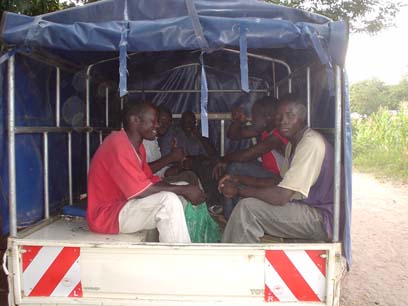
Photo: My pick up, the "Saa Moja" bus
Daniel (Monday: one hour late, Tuesday: half an hour late), claims dispensation of saa moja for medical checkup of his pseumonia.
Wednesday: painting boards #1, inside: high deck beams and stiffeners, welding triangles
Saa moja. Gabriel standing ready at the staff bus stop. Even 15 minutes, he
claims. Doi, a young worker arrives at seven. The next hitch: the key holders of
the tool store have not yet arrived.
After threatening all tools shall go in my car tonight, another solution is
found.
Daniel is now 3 hours late.
Did the check up take that long? I ask.
No, he had to wait.
I am suffering all day, not used to my self imposed time regime. After high school, I
never had a day schedule looking like this.
Thursday: painting boards #2, inside: high deck beams and stiffeners, putty, welding triangles
Everybody saa moja, only Daniel 5 minutes late.
Friday: high deck beams and stiffeners, putty, welding triangles, preparing hull for fixing triangles
Everybody saa moja, even Daniel, but he is the last.
During the day it gradually seems to become the habit of the workers to call me
"commander". But this commander would be impotent without Gabriel.
Saturday: putting the dhow on port, caulking bottom starboard, low deck beams and stiffeners
Everybody saa moja, including Daniel, only caulker Moses is 90 minutes late. At home I have prepared a speech in Kiswahili to my caulkers. I decided to deliver it to caulker Johnny:
Dear Johnny,
Today is the most important day of the rest of my life.
You see, the rest of my life, this boat will be my house.
If you are doing your bottom caulking perfectly, I will be dry
If you do it badly, I will be wet.
Please think of this when you are doing your job today: the rest of my life is in your hands.
With a mix of laughter and being flattered to be ranked so high today, Johnny gets to work..
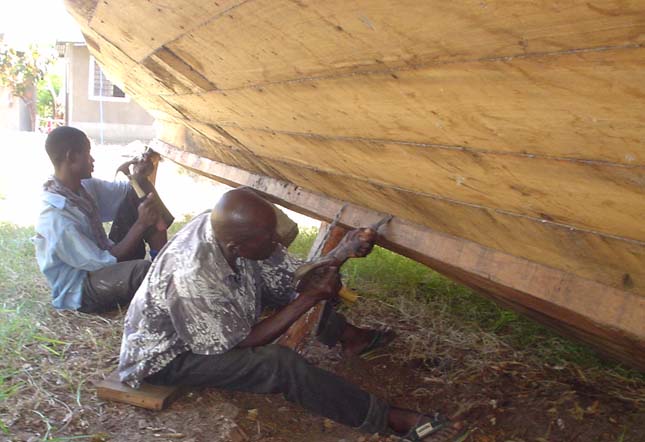
Picture: Moses (l) and Johnny (r) caulking the keel (grey hard blanket cloth hammered in the joints)
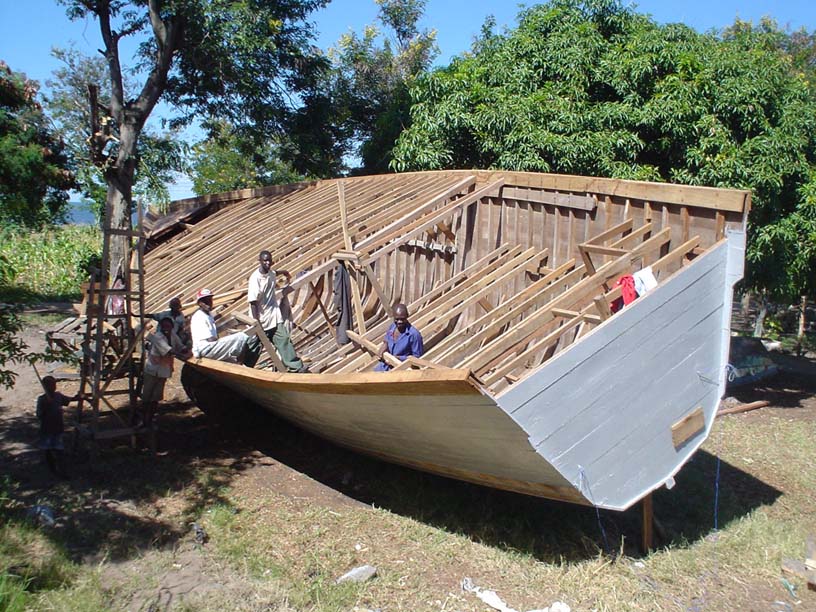
Photo: on one side for bottom caulking. All decks and floors almost ready
for planking. Two of the tree rabbets ready for fixing hatches.
The mango tree (starboard side) now serves as access stairs. Launching in one
week?
We get a visit from Feleshi, who was going to help me to get the dhow ready
at the contract date December 21, who had TSh 60 000 in air time and afterward
begged for TSh 80 000 for a "schoolfee problem of his son", which he got, in total a six week wage with no effect
whatsoever on building speed. He looked at the dhow and said: I am verry happy.
He is driving a absolutely brand new bicycle.
Asshole. But of course the biggest asshole is me.
Our lunch: Dagaa or Furu (the fish claimed to have been preyed upon to extinction in "Darwin's nightmare" but in truth abundantly present), with polenta and spinach. The real Furu lovers are the Ukerewe Islanders, who even chew and swallow the bones. No Furu fishers ever had any problem to find their catch, I was told during this lunch.
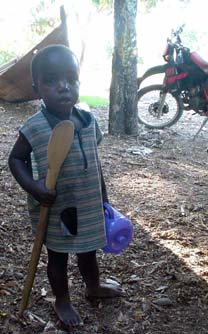
The feverish activity at the yard attracts a host of curious observers.
She does not carry a canoe peddle but a kitchen spoon, and a water can.
Since Moses and Johnny, the ones applying the dawa, are muslems, they
are ready to work on Sunday. But where is the remainder of the grey epoxy paint
we used for the boards? That is what we should mix with sawdust to make the
dawa. Not in Daniel's store. I order Daniel to call the painters.
No, is the answer, they had exactly finished the paint.
A lie. Stupid me, not to check the thugs at the end of painting, Thursday.
No paint. No work for Sunday.
Gerald tells me if I leave the cooker on we will not share anymore equally the electricity-bill
Sunday
Finally. No alarm clock. I wake up at seven. Fresh.
Time for some thoughts.
For long, I am acquainted with the story that to Africans the world is full of
forces stronger than them, thwarting their plans every day. Hence the acceptance
of broken agreements, delays, and the
African idea of time
as a living sequence of actions and events rather than the pace of a regular
machine like a clock. This week, I discovered that the larger part of this
"unexpected" thwarting is not done by "forces stronger than you": when you buy
bolts, they may get finished at the end of the morning. You may have to go to
town to buy more. You may have no money for transport. You may go on foot (2
hours), or to go home and continue the job the next day. When the muzungu is
just calculating the proper amounts of all types of bolts you need and buys
them, you can continue working all day. A matter of having a clear, anticipating
mind, able to write and calculate. Even Gabriel, the best builder around, can
not do it properly. There is pen nor paper on the yard. If they draw, it is with
a pencil on the ship or in the sand. While calculating, I sometimes see them
make the figure symbolically on some surface with their fingers.
How did a man like Daniel arrive at his contract sum of TSh 13 000 000/= for the
entire dhow? He can not even calculate how much wood he needs for the floor
only! Since other yards asked roughly the same price, our contract price cannot too
far astray.
How is a money advance of
TSh 1 000 000/=, as I gave Daniel several times, represented in his mind? Daniel
truely feels that the accusations by Gabriel and me that he misused the money as
true. But can he really know
whether he misused money or not?
To cope with the situation, the muzungu now comes to the yard, saa moja,
with a pickup loaded with workers, a padlocked welded metal box with tools,
hardware and paint, and a fast motorcycle.
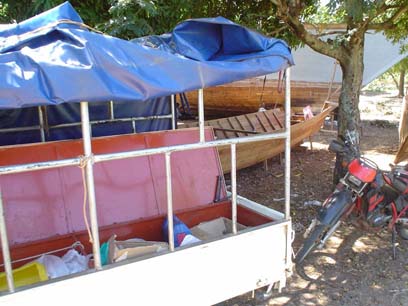
Picture: My pickup with tools, bolts and paint in its double locked welded
steel box
Motorcycle for quick search of stocks of rare hardware
The motorcycle is used to search for rare hardware suddenly discovered to be
necessary. Anyone with brains would have known more than one year ago that it
would be necessary,
but the African "suddenly discovers" a necessity. We cannot order and wait for
delivery (remember a 2 day time span for delivery of paint turned out to be 21,
for the same sorts of reasons). So the muzungu moves by motorcycle to the
densily crowded town centre from one shop to another until he has what is
needed. Since the muzungu now has to anticipate on behalf of the carpenters, he
needs to do sharp interviewing, otherwize every single thing
"suddenly discovered" a necessity
will require a separate trip to town.
The painters were ordered for Wednesday, but could not make it before ten
o'clock. Indignation all around among my saa moja people. You are lucky
they will be late, I said: you did not yet put the proper screws at the places
it took me one hour to mark last Monday, and we have a list of planking defects
to repair. All should be done before we can paint.
That turned out to be a new thought. Feverish activity.
The next day, when the painters stood ready, the screwing and planking was not
yet completely finished. Then they realized, neither had I thought about it: all
screw holes should be filled with putty. Fortunately I had already bought putty
for some other applications.
Putting the dhow on its port board for caulking the starboard bottom was planned
for saa moja, the same time the caulkers would begin. First one took a
heavy hardwood beam as a lever. After five men set out to lift is, the lever
started to crack. One started to think of a jack. Of course noone had one. I
did, but I told them it would be useless to try a 1 ton jack for a 5 ton ship.
Indeed, they discovered the truth, fortunately without destroying my jack. Off
to a garage to find a heavy jack.
Etc. etc. etc.
Less than half of the of the problem of moving parallel inertia is caused by doing nothing or little. The rest is caused but not having thought of necessary jobs in the first place, and waiting for these unanticipated jobs to be prepared for and done, that is: inability to anticipate (details).
Right now, the project culture has become a curious mix: I leave the architecture to the Africans. Thusfar, I corrected them only in decided to glue and bolt an additional keelson, the stiffeners advised by Nkaka and the deck caulking (sikaflex), and the shape and construction of the hatches. This will be an essentially African ship. But I wonder if, with only my money, and without my interference in organisation and planning, we would ever have one.
Neither do I want to think of having to build this boat without a cell phone. The Africans, limited as they are in thinking ahead, making and keeping sensible agreements, profit much more from the cell phone than other races. The cell phone softens the drawbacks of last minute awareness of impediments to their jobs, a mental feature strongly endemic in Africa. Absence of cell phones and my quick pick up and motor cycle transport and crisis shopping would prolong the dhow building ordeal with at least another year.
Daniel got TSh 11 000 000/= of his
TSh 13 000 000/=. The remaining
TSh 2 000 000/= I spend this week on wages, hardware, paint and wood.. Next week
Daniel dives in the red. Now I have kept my agreement for handover in my pocket
and simply took over without any formal step, his debt will be a hard legal
claim under our contract. He will never be able to pay, but I will keep power
over him, which might be useful.
| Greetings Home |
| Previous Greeting |
|
|
| Previous Dhow Logbook |
| Next Dhow Logbook |